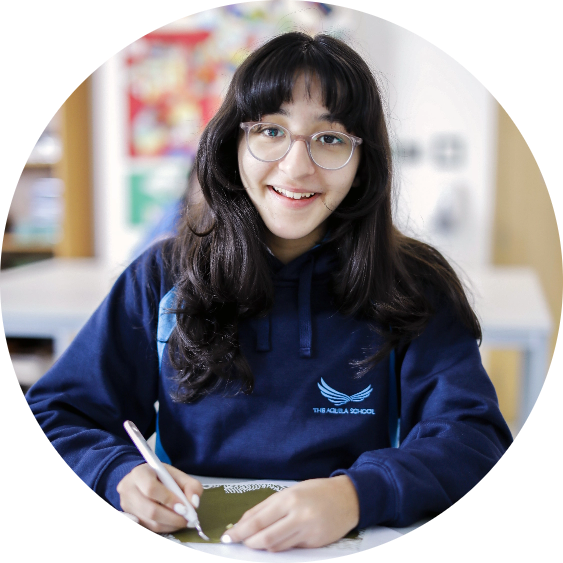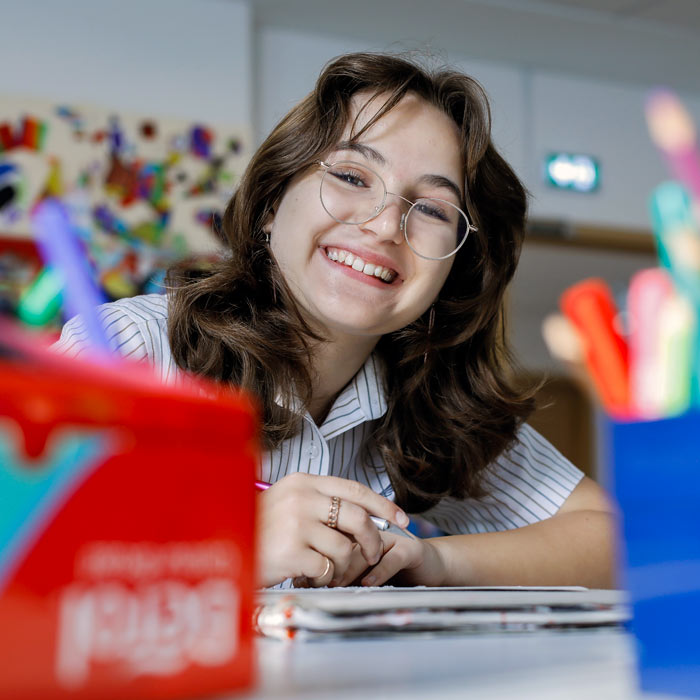Secondary at The Aquila School
At The Aquila School, we believe that every child deserves the best possible education.
Our secondary school curriculum is designed to challenge and inspire pupils, while also providing them with the skills and knowledge they need to succeed in the future.
Key Stage 3
(Years 7 to 9)
Our Key Stage 3 curriculum is based on the English National Curriculum, but it has been adapted to meet the needs of our pupils and the UAE context. We offer a wide range of subjects, including English, mathematics, science, humanities, languages, and the arts. We also offer a number of extra-curricular activities (ECAs), so that pupils can choose activities that they are passionate about.

About learning
Our teachers are highly skilled and experienced, and they are committed to helping each pupil reach their full potential. They use a variety of teaching methods, including inquiry-based learning, problem-solving, and project work. They also create a positive and supportive learning environment where pupils feel safe to take risks and learn from their mistakes.
At The Aquila School, we believe that every child is unique and has their own special talents and abilities. We are committed to helping each pupil develop their full potential, both academically and personally. We want our pupils to leave school with the skills and knowledge they need to succeed in the future, and we also want them to be well-rounded individuals who are confident and compassionate.
British Secondary School Subjects (Key Stage 3)
Subjects in Years 7 to 9:
-
English
-
Sciences
-
History
-
Spanish
-
Islamic Studies (for our Muslim pupils)
-
Design and technology
-
Music
-
Dance
-
Moral, social and cultural studies
-
Mathematics
-
Computing
-
Geography & Sustainability
-
Arabic
-
Art and design
-
Food Technology
-
Drama
-
Physical education
-
PSHE

Key Stage 4
(Years 10 and 11)
International GCSEs and professional vocational qualifications at Level 2
Key Stage 4
(Year 10 and 11)
International GCSEs and professional vocational qualifications at Level 2

About learning
When pupils enter year 10, they begin their Key Stage 4 programme of study. Careful planning and preparation is required to ensure each pupil follows a course that best suits his or her needs, which in turn allows them to make as much progress as possible.
In Key Stage 4 our pupils are exposed to a broad and balanced curriculum that enables and prepares them to naturally progress into Sixth Form (Year 12 and Year 13).
In years 10 and 11, pupils work towards a range of qualifications in which they improve their academic, creative, personal and sporting skillsets. Each qualification is structured to ensure equitable coverage of knowledge and skills with an incremental challenge. Our Key Stage 4 curriculum is sequential, builds on prior learning and gives opportunities for pupils to revisit and consolidate learning so they are fully prepared for their external examinations.
Our teachers provide timely, incisive and formative feedback on all pupil work – this ensures any misconceptions or gaps in learning are identified and this information is used to plan lessons to accelerate progress. We also have formal assessments in years 10 and 11 using previous exam papers. This allows our pupils to develop the key skills of resilience and independence in an exam setting.
At each stage of assessment, pupils are given personalised, detailed feedback with next steps allowing them to reflect and take ownership of their learning.
What will pupils learn during Key Stage 4?
- Core: All pupils must follow a ‘core’ curriculum including mathematics, sciences and environmental management and English (language, literature or second language); along with Ministry of Education Arabic for native Arabic speakers and Islamic Studies for Muslim pupils.
- Options: In addition, pupils choose three optional subjects, with support and guidance from staff and families. Subjects are offered based on pupil request and demand, and includes: Spanish, business, geography, history, computer science, IT, separate sciences, DT, art, music, drama, performing arts, sport and PE.
- Compulsory non-examination subjects: Pupils also study moral, social and cultural studies and participate in physical exercise in order to promote a healthy mind and lifestyle. In Year 10 non-native Arabic speakers also study Arabic.
Optional subjects
In addition, pupils choose three optional subjects, with support and guidance from staff and families. Subjects are offered based on pupil request and demand, and includes:
In addition, pupils choose three optional subjects, with support and guidance from staff and families.
Subjects are offered based on pupil request and demand, and includes:
In addition, pupils choose three optional subjects, with support and guidance from staff and families. Subjects are offered based on pupil request and demand, and includes:
-
Spanish
-
Geography
-
Computer science
-
Separate sciences
-
Art
-
Drama
-
Sports
-
Business
-
History
-
IT
-
DT
-
Music
-
Performing Arts
-
PE
Compulsory non-examination subjects
Pupils also study moral, social and cultural studies and participate in physical exercise in order to promote a healthy mind and lifestyle. In Year 10 non-native Arabic speakers also study Arabic.
GCSEs and International GCSEs


GCSEs and International GCSEs
Professional vocational
qualifications

Professional vocational
qualifications

